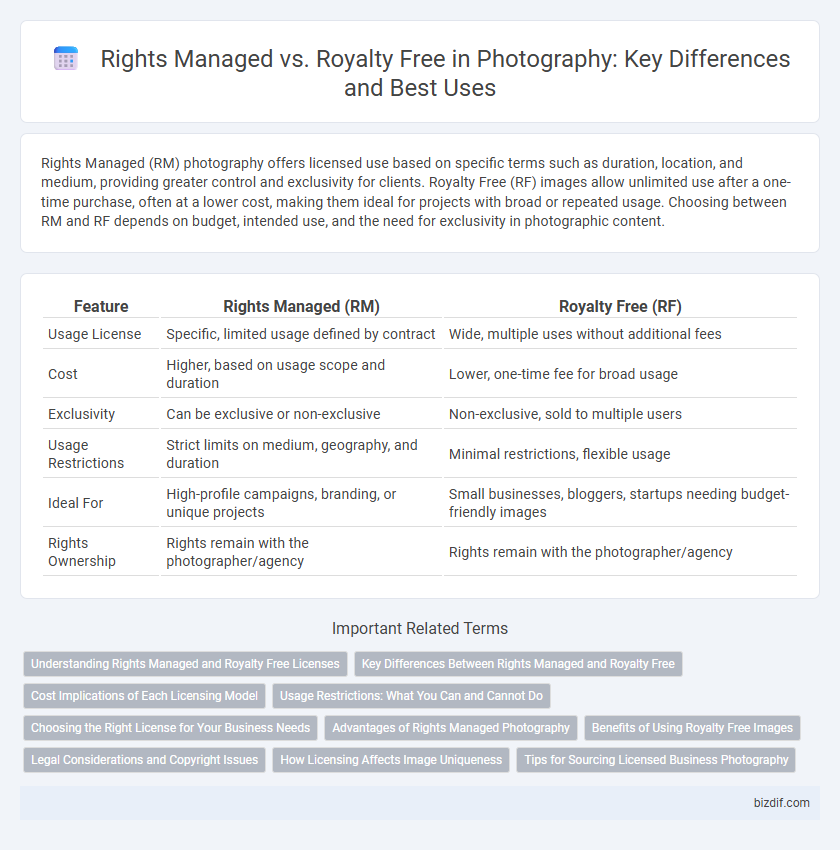Rights Managed (RM) photography offers licensed use based on specific terms such as duration, location, and medium, providing greater control and exclusivity for clients. Royalty Free (RF) images allow unlimited use after a one-time purchase, often at a lower cost, making them ideal for projects with broad or repeated usage. Choosing between RM and RF depends on budget, intended use, and the need for exclusivity in photographic content.
Table of Comparison
| Feature | Rights Managed (RM) | Royalty Free (RF) |
|---|---|---|
| Usage License | Specific, limited usage defined by contract | Wide, multiple uses without additional fees |
| Cost | Higher, based on usage scope and duration | Lower, one-time fee for broad usage |
| Exclusivity | Can be exclusive or non-exclusive | Non-exclusive, sold to multiple users |
| Usage Restrictions | Strict limits on medium, geography, and duration | Minimal restrictions, flexible usage |
| Ideal For | High-profile campaigns, branding, or unique projects | Small businesses, bloggers, startups needing budget-friendly images |
| Rights Ownership | Rights remain with the photographer/agency | Rights remain with the photographer/agency |
Understanding Rights Managed and Royalty Free Licenses
Rights Managed licenses provide controlled usage of images, specifying exact terms like duration, location, and purpose, ensuring exclusive or limited use. Royalty Free licenses grant broader usage rights for a one-time fee, allowing multiple uses without additional payments but do not imply exclusivity. Understanding these differences impacts budgeting and legal compliance in photography projects.
Key Differences Between Rights Managed and Royalty Free
Rights Managed licenses grant specific usage rights for a set duration, location, and purpose, offering controlled exclusivity and tailored pricing based on usage parameters. Royalty Free licenses allow unlimited use after a one-time fee without restrictions on time or geographic region, providing greater flexibility and cost-efficiency for multiple projects. Key differences include usage limitations, licensing costs, and exclusivity, with Rights Managed suitable for exclusive or high-value projects and Royalty Free ideal for broad, repetitive use.
Cost Implications of Each Licensing Model
Rights Managed licenses typically involve higher upfront costs with fees based on factors like usage duration, geographic region, and media type, making them ideal for exclusive, controlled use. Royalty Free licenses offer a one-time payment granting broad, perpetual usage without additional fees, resulting in lower overall costs for multiple or ongoing projects. Businesses must assess their budget and usage needs to determine the most cost-effective licensing model for photography assets.
Usage Restrictions: What You Can and Cannot Do
Rights Managed (RM) licenses impose specific usage restrictions based on parameters like duration, location, and media, requiring users to adhere strictly to agreed terms and pay additional fees for extended use. Royalty Free (RF) licenses offer broader usage rights, allowing multiple uses across various projects without extra payments, but typically prohibit resale or unauthorized redistribution. Understanding these usage limitations ensures proper licensing compliance and avoids legal issues in commercial photography applications.
Choosing the Right License for Your Business Needs
Choosing the right license between Rights Managed and Royalty Free depends on your business's specific usage requirements and budget constraints. Rights Managed offers exclusive, controlled use for each licensing period, ideal for targeted campaigns requiring uniqueness and legal protection. Royalty Free provides flexible, unlimited use at a fixed fee, making it suitable for small businesses needing cost-effective access to diverse images without usage restrictions.
Advantages of Rights Managed Photography
Rights Managed photography offers precise control over image usage, allowing photographers and buyers to negotiate specific terms such as duration, geographic region, and exclusivity, which ensures tailored licensing and maximized revenue. This licensing model protects the unique value of images by preventing unauthorized or overuse, thereby preserving brand integrity and image exclusivity. Clients benefit from the ability to customize licensing to their exact project needs, reducing overall costs and ensuring legal compliance.
Benefits of Using Royalty Free Images
Royalty free images offer significant cost efficiency by allowing unlimited use after a one-time purchase, making them ideal for businesses with ongoing visual content needs. They provide flexibility across various projects without requiring additional permissions, saving time on licensing negotiations. The broad accessibility and diverse selection of royalty free libraries enable seamless integration into marketing, web design, and social media campaigns.
Legal Considerations and Copyright Issues
Rights Managed (RM) licensing grants specific, controlled usage rights to a buyer with clear restrictions on duration, location, and purpose, ensuring legal clarity and stronger protection for the copyright holder. Royalty Free (RF) images allow multiple users to access the same file with fewer restrictions but require adherence to license terms to avoid copyright infringement and unauthorized use. Understanding the legal nuances between RM and RF licenses is essential to prevent violations, secure proper usage rights, and protect intellectual property in commercial photography.
How Licensing Affects Image Uniqueness
Rights Managed licenses restrict image usage by specifying exact terms, ensuring each image maintains uniqueness through controlled distribution and limited use. Royalty Free licenses, by contrast, allow unrestricted use after purchase, leading to widespread image repetition and reduced exclusivity. Photographers and buyers seeking distinct, exclusive visuals often prefer Rights Managed licensing to protect image uniqueness.
Tips for Sourcing Licensed Business Photography
When sourcing licensed business photography, prioritize understanding the distinctions between Rights Managed (RM) and Royalty Free (RF) licenses to ensure proper usage rights and budget alignment. RM images offer exclusive, time-bound usage tailored to specific needs, while RF images provide broader, unlimited use at a fixed cost, facilitating flexibility for varied marketing channels. Always verify the license terms, usage restrictions, and attribution requirements to avoid legal issues and maximize the value of your business photography investment.
Rights Managed vs Royalty Free Infographic

 bizdif.com
bizdif.com